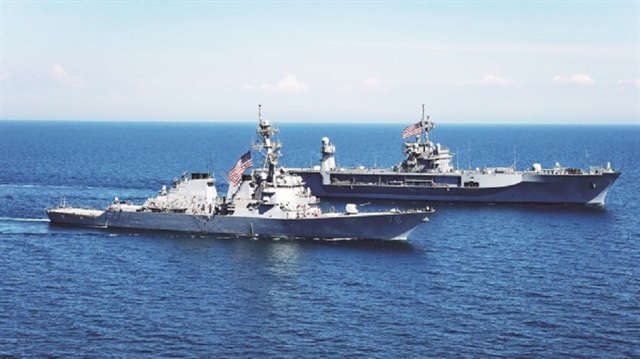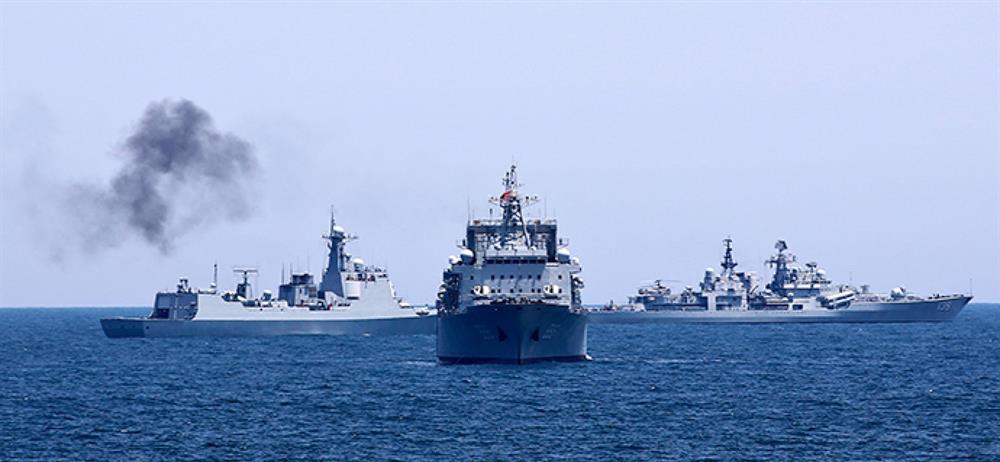
While all eyes are on Syria’s Idlib, many countries are amassing a naval presence in the Eastern Mediterranean as a possible energy war looms
Fears of a massacre in Syria’s Idlib are hiding the moves made for “energy wars” that will last for decades in the Mediterranean. The United States has dispatched a command ship while Britain has deployed a nuclear submarine. Warships will follow drill ships. First companies from the U.S., then France, Britain and Italy will begin drilling in the area.
U.S. oil and gas corporation Exxon is due to send two surveying vessels on Sept. 28 to explore offshore Cyprus near the area where Turkey blocked an Eni drilling ship from prospecting in February. Total, Shell, Eni, Qatar Petroleum, Noble Energy and Kogas also plan on initiating explorations in the Mediterranean.
Meanwhile, the Greek administration of Cyprus has granted France permission to use its sea and air bases.

The U.S. also requested a base from Cyprus. In the face of these developments, Turkey has taken precautions with its fleet and is also due to launch explorations with the national Fatih ship in an area dubbed as rich in resources by a vessel that conducted seismic surveys. Turkey is expected to protect its interests and defend its rights in the Eastern Mediterranean, which could become the battlefield of an energy war.
New deployments to the Eastern Mediterranean have continued. The U.K.’s nuclear powered submarine HMS Talent entered the Mediterranean in early September joining three other nuclear submarines and three U.S. destroyers. The USS Mount Whitney, the flagship of the U.S. Sixth Fleet, sailed to Greece’s Thessaloniki under the guise of the International Trade Fair.
This buildup occurred amid tensions surrounding a possible offensive targeting Syria’s Idlib. The Syrian regime recently announced plans to launch a major military offensive in Idlib, which remains under the control of various armed opposition groups. The last such provocation triggered joint airstrikes by the U.S., UK and France against the Syrian regime.

France has had a warship stationed in the waters of the Eastern Mediterranean for an extended period of time. While the Standing NATO Maritime Group has three ships deployed in the Mediterranean, other countries add supporting ships from time to time.
Russia also staged a major naval exercise in the eastern Mediterranean this month and its jets resumed bombing the Syrian region of Idlib, the last major enclave of the opposition fighting its ally President Bashar al-Assad.
More than 25 warships and support vessels and around 30 planes, including fighter jets and strategic bombers, took part in Russia’s Mediterranean drills between Sept. 1 and Sept. 8. Ships from Russia’s Northern, Baltic and Black Sea Fleets as well as vessels from its Caspian Flotilla participated in the drills, which were led by the Marshal Ustinov missile cruiser.
Under the scope of the 2007 agreement France signed with Cyprus, it has started to use sea and air bases. The U.S. is also attempting to utilize Cyprus’ bases. The U.K. already has sea and air bases in Cyprus. An interesting detail is that the Limassol port in Cyprus is used jointly by Russia and the U.S.
Greek newspapers have reported that “a war that is not clear at first is developing in the Eastern Mediterranean,” and that if energy resources were found, then warships would be put into action.
The fleet mobilization in the Mediterranean is linked to the drilling activities to be launched in autumn. Turkish Navy vessels blocked a drilling ship that oil major Eni hired to explore for oil and gas offshore Cyprus in late February, effectively protecting the rights and interests of Turkey.
As Turkey showcases a resolute stance to protect its rights and interests in the Eastern Mediterranean, it is taking precautions against any fait accompli within the context of the explorations that will begin in autumn. Turkey will forge a strong presence in the area with its natural gas exploration and drilling ships.





